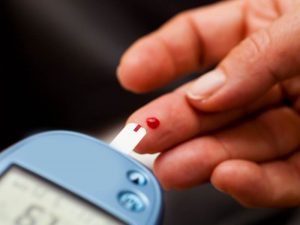Diabetes made simple for a First Aider
Diabetes is more common than ever, so as a First Aider we should know how to deal with someone with Diabetes if they need help. This is very simple information and is not supposed to be an in depth document.
 Checking blood sugar levels (Diabetes)
Checking blood sugar levels (Diabetes)
What is Diabetes?
The body’s inability to produce the correct amount of the hormone insulin which essentially balances out the amount of sugar someone ingests. Insulin also allows the body to access sugar to be used to feed muscles. Insulin is a bit like the key to unlock the door to the sugar cupboard.
Diabetic problems
Too much sugar – Hyperglycaemia (high)
This takes a long time (days or even weeks) to get to dangerously high levels, so the level of hyperglycaemia witnessed by any first aider is rarely likely to be that severe. However, with moderate hyperglycaemia (due to perhaps missing an insulin injection, or suffering with a systemic illness eg a bad cold, or due to over-eating carbohydrates over the last couple of days), the diabetic person will feel unwell and his/her muscles won’t be working very well because there isn’t sufficient insulin on-board to ‘unlock the sugar cupboard’. The person will be aware that he/she has mismanaged their diabetes, but because they have lots of sugar in their body, their brain will function correctly and they should be able to manage the situation themselves.
Not enough sugar – Hypoglycaemia (low)
The signs and symptoms can come on very quickly, sometimes less than 10 minutes, that’s why this is a medical condition which a First Aider should be ready to help with.
Signs and Symptoms:
- Weakness
- Hunger
- Fainting
- Confusion
- Irrational behaviour
- Sweating with cold clammy skin
- Rapid breathing
- Muscle tremors (shaking)
- Deteriorating level of response
What we can do:
- Ask them if they are diabetic – response might not be great as they have very little sugar in the body and the brain ONLY uses sugar for its fuel. No fuel = confusion and irrational thinking. If poor response or no response, check if they have a medi-alert bracelet, necklace, medical information in wallet or on their phone
- Get sugar into the them; eg, a sugary drink, sugary sweets etc
- If they are un-conscious – If you are 100% they have lost consciousness due to hypoglycaemia you could rub something sugary onto their gums, for example jam or energy gel. DO NOT pour a drink into their mouth, they have no gag reflex (the ability to swallow) so you would pour the fluid into their lungs which is very very bad and could kill them!
Once their blood sugar levels increase the brain will have some fuel and they will then be able to manage the situation themselves, help them if they need it, but remember, they will know more about how to manage their diabetes than you do, so just assist them!
Other info:
Type 1 or type 2 diabetes
Don’t worry about the difference between the two types this does not matter for us as first aiders – this is about keeping it simple.
Does their breath smell of pear drops if they have a hypoglycaemic episode?
No, it won’t necessarily smell of anything in particular. However, someone who is clearly unwell and whose performance is lacking, could be a poorly-controlled diabetic, who is suffering from hyperglycaemia (too much sugar), and in that case, his or her breath will smell of pear-drops, because of the high level of circulating ketones (ketones are produced by the liver if the body starts to metabolise fat instead of carbohydrate because of the insufficient amount of insulin on-board). An individual who is ketotic should not be exercising, so if hyperglycaemia/ketosis is suspected, the sufferer should be advised to drink plenty of water and return to base in order to stabilise his/her condition.
Thank you
I’d like to thank my good friend Ellie who helped me put this simple information together, by day she is a vet and in the evenings and weekends she an amazing athelete with over a hundred mountain marathons under her belt as well as tens of thousands of miles on her mountain bike and road bike. She is diabetic herself and shares the passion of keeping information straight forward and simple so First Aiders can be even better at helping others. Thanks Ellie x
© 1FirstAid1 February 2018
